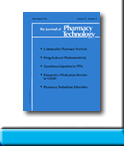 |
 |
Compliance with Renal Dosing Guidelines for Outpatient Antiinfective Prescriptions
Cheryl R Durand, Robert J Carr, Samantha M Boudreau
To request full article click here.
Background: More than 80-95% of adverse drug events occurring among renally impaired patients are related to excessive dosing.
Objective: To assess current prescribing practices with antiinfectives for patients with estimated creatinine clearance (CrCl) less than 51 mL/min who were in a local health care system.
Methods: Outpatient antiinfective prescriptions written during a 10-day period in July 2012 were reviewed. The following information was collected for each patient: age, sex, serum creatinine, weight, height, drug dose and schedule, and discharge unit/outpatient service. Kidney function was estimated by calculating CrCl using either the Cockcroft-Gault or the Jelliffe equation. Two resources were used to identify appropriate dosing for renal function; if the 2 resources differed, the stricter of the 2 was used for assessment. Institutional review board approval was obtained for this study.
Results: A total of 91 prescriptions, written for 87 different patients, met inclusion criteria and were reviewed. Average CrCl and age among the study population was 37.82 mL/min, and 75.7 years, respectively. Doses were excessive in 30% of outpatient prescriptions. The most common medications involved in excessive dosing were trimethoprim/sulfamethoxazole (TMP/SMX), cephalexin, fluconazole, and acyclovir. TMP/SMX was dosed excessively in 80% of prescriptions. Both fluconazole and acyclovir were dosed excessively in 75% of prescriptions, while cephalexin was dosed in excess in 36% of prescriptions. A comparison of discharge units/outpatient services revealed that 56% of prescriptions from urgent care centers were dosed in excess, compared with 30% from hospital discharge, 20% from emergency department discharge, and 25% from outpatient services.
Conclusions: Our study indicates that there is room for improvement when dosing antiinfective medications for outpatients with renal insufficiency. Appropriate renal dosing can help protect patients from dangerous toxicities and other adverse drug events.
J Pharm Technol 2013;29:186-90
To request full article click here.
|
|
|
||
|

